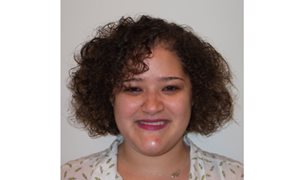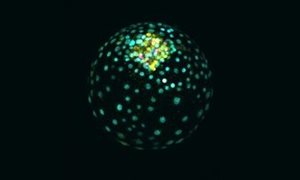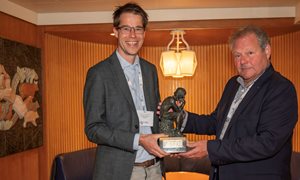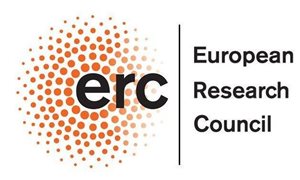 Cellular activities are dictated by proteins. Deciphering how proteins interact in a healthy or diseased state is a key area of interest in biology. Eventually, this will facilitate the development of drugs for many diseases including cancer, which is ultimately the result of misregulated protein homeostasis.
Cellular activities are dictated by proteins. Deciphering how proteins interact in a healthy or diseased state is a key area of interest in biology. Eventually, this will facilitate the development of drugs for many diseases including cancer, which is ultimately the result of misregulated protein homeostasis.
In recent years, affinity purification coupled to mass spectrometry (AP-MS) has been the preferred method to identify cellular protein-protein interactions. Unfortunately, AP-MS experiments typically require large amounts (millions of cells) of input material. For this reason, AP-MS studies are mostly restricted to cancer cell lines that can be grown in large quantities in vitro. Cristina Furlan and René Dirks from the groups of Michiel Vermeulen and Hendrik Marks, research theme Cancer development and immune defense, teamed up to address these limitations by developing a low input AP-MS workflow, called on-chip AP-MS, which can be used to perform AP-MS experiments using a few micrograms of lysate from a few thousand cells. This was achieved by implementing an AP-MS method in a automated, microfluidic device from the company Fluidigm using nanoliter volumes.
With the development of on-chip AP-MS, clinical samples, rare cell types and organoids, which are difficult to obtain in large quantities, can now be investigated using interaction proteomics studies. The field of mass spectrometry-based interaction proteomics is thus taking an important next step towards applications in biology and medicine which thus far, due to technical constraints, have remained elusive. This study was recently published in Nature Communications.
Related news items

T cell immunity is directed by tetraspanin CD53
5 July 2022 T cells are immune cells that are key for the defense against pathogens and cancer. T cells depend on the membrane protein CD45 to initiate T cell receptor signaling, but how CD45 is controlled at the molecular level is poorly understood. read more
A single protein complex balances the very first lineage decision of cells in human: towards foetus or placenta
21 June 2022 The international group of researchers spearheaded by Dick Zijlmans and Hendrik Marks together with colleagues from KU Leuven, examined which proteins are associated with the chromatin and how this affects gene transcription. read more
Dutch Society of Clinical Chemistry Science & Innovation Award for the team of Hans Jacobs
14 June 2022 The team of Hans Jacobs pioneers on the development of personalized diagnostics to measure minimal residual disease in patients with multiple myeloma. read more
European grants for groundbreaking Radboudumc research Professors Roshan Cools and Peter Friedl receive ERC Advanced Grant
26 April 2022The European Research Council (ERC) is awarding grants to Roshan Cools and Peter Friedl, both professors at Radboudumc. While Cools will investigate how brains control behaviour in (stressful) situations, Friedl will work on developing a new cancer therapy.
read more
Saponin-based adjuvant-induced dendritic cell cross-presentation is dependent on PERK activation published in Cellular and Molecular Life Sciences
20 April 2022 Lisa Huis in ‘t Veld, Nataschja Ho and colleagues from the team of Gosse Adema published in Cellular and Molecular Life Sciences that Saponin-based adjuvant-induced dendritic cell cross-presentation is dependent on PERK activation. read more
Rubicon grants awarded to three RIMLS researchers
19 April 2022Three researchers have received Rubicon funding from NWO/ZonMw. This will enable Elke Muntjewerff, Laura de Vries and Laurens van de Wiel to do research at a foreign research institute for the next two years.
read more